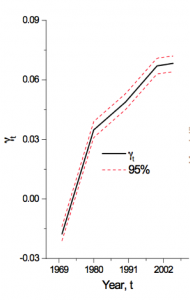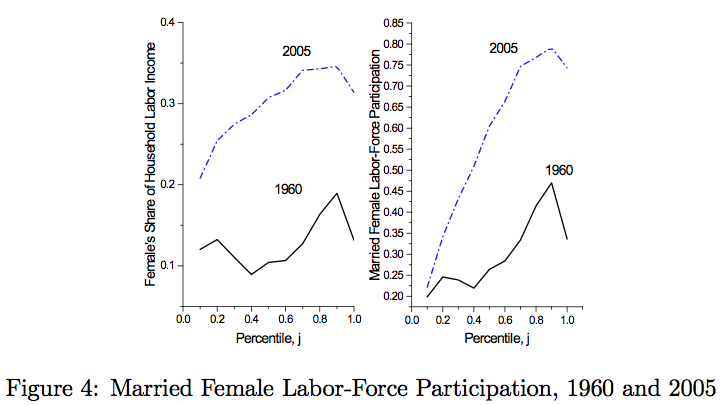 by Zach Porter There is often a time around mid-February where I find myself thinking two rather distinct thoughts. The first is generally selfish: “I sure do wish that there was someone special in my life that I could share Valentine’s Day with.” The second is entirely selfless: “I sure do wish that there was significantly less income inequality in America.” It may seem that these two thoughts are wholly disjointed, but that’s not entirely true. What if there was some way to guarantee both companionship for self, and greater equity for all? Such an outcome may be within sight. But who cares if more educated women are marrying more educated men? And how does marital sorting affect household income inequality?This is not a new question, and the authors cite several papers that have explored it before – each of which reach a similar conclusion: increasing assortative mating has increased household income inequality. In summarizing their findings, the authors highlight some income-to-mean-income ratios for different education pairings both in 1960 and 2005. Specifically, they find: “In 1960 if a woman with a less-than-high-school education married a similarly educated man their household income would be 77 percent of mean household income. If that same woman married a man with a college education then household income would be 124 percent of the mean.” While these combinations were likely selected to maximize income differentials, examining the income differentials of similarly educated households across time provides a more salient comparison. The less-than-high-school/less-than-high-school family in 1960 had an income equal to 77 percent of the mean income. In 2005, this same family had an income equal to only 41 percent of the mean. In 1960, a married couple with both husband and wife having post-college education had an income equal to 176 percent of the mean income. In 2005, the same family had an income of 219 percent. The drastic shift downward for low-education families, and upward for high-education families, are symptoms of the increase in assortative mating. So what is the causal story? First, there has been a rapid rise in education levels among married females. The proportion of married women with less than a high school education plummeted from 1960 to 2005, sinking from43 percent to only 7 percent. Meanwhile, the proportion of married women with college degrees in2005 was nearly four and a half times higher than in 1960, increasing from 5 percent to 24 percent. The percent of married women with post-college education also increased, from about 1.5 percent to 12 percent. Secondly, this meteoric rise in education for women has translated into higher labor-force participation and higher earnings. Married women with higher education not only marry men with higher education, but also tend to have higher labor-force participation rates and earn a higher proportion of household income than their less educated counterparts. This can be seen from Figure 4 of the publication: To quote President Obama from his 2014 State of the Union address, “I believe when women succeed, America succeeds.” I share this belief with the President, though this paper suggests a more accurate statement: “when well-educated women succeed, their well-educated families succeed.”
Assortative mating contributes greatly to income inequality, and the effect is only growing larger. Thankfully, the authors construct a counterfactual – what would income inequality be if marriage were not assortative? What if couples were randomly paired instead? The mathematical models are complex, but their results indicate that if individuals were randomly paired with their spouses, income inequality would decrease substantially. If the Obama administration truly cares about reducing income inequality, the policy implication of this paper is clear: The creation of a Bureau of Spousal Assignment (BSA) within the Department of Health and Human Services. The Bureau would assign spouses to all citizens wishing to engage in the life-and-benefit-sharing contract known as “marriage.” Federal matchmaking would increase the overall rate of marriage while ensuring that no American is actively promoting income inequality through selfish mating decisions. When calculating matches, The BSA would take into account certain preferences – much like online dating sites – but randomize education levels. This would maximize happiness and relational longevity while minimizing income inequality. This February, the creation of Bureau of Spousal Assignment could fulfill my dual longing: companionship for self, and higher equity for all. —– Zachary Porter is a first-year in the Batten School’s B.A./M.P.P. program, finishing up a double major in Economics and Music. He has broad policy interests including human trafficking, economics and national security. He previously worked at the Legal Aid Justice Center in Charlottesville, aiding in providing services to low-income individuals in the area.
0 Comments
Your comment will be posted after it is approved.
Leave a Reply. |
Categories
All
Archives
April 2022
|
ADDRESSVirginia Policy Review
235 McCormick Rd. Charlottesville, VA 22904 |
|
SOCIAL MEDIA |
